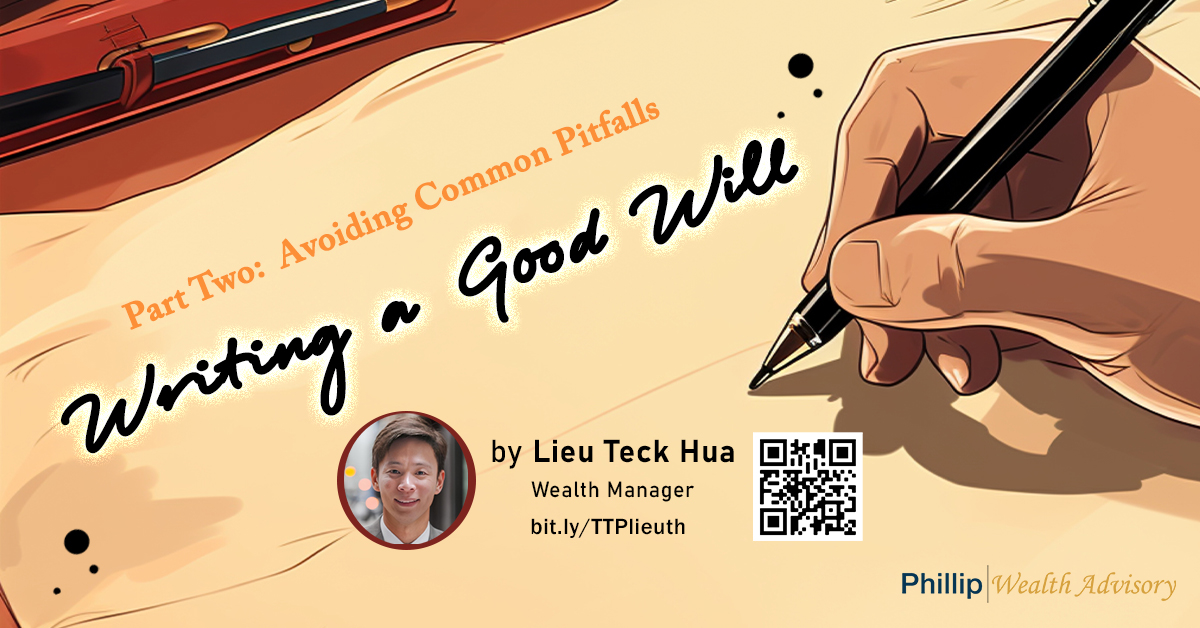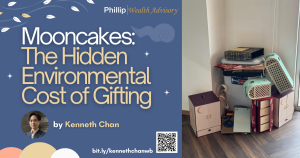Writing a Good Will: Avoiding Common Pitfalls (Part 2) June 13, 2024

(This article doesn’t apply to foreigners nor our Muslim friends in Singapore.)
Welcome to the second installment of “Writing a Good Will.” A Will plays a vital role in ensuring the fulfillment of your final wishes and the well-being of your loved ones in your absence. Previously, we discussed the importance of having a Will and who should consider writing one.
In this second part of the trilogy, I will discuss the essential components of a well-crafted Will and highlight common pitfalls to avoid. I have structured the content into the following sections:
- Ensuring Will Validity
- Selecting Key Personnel
- Designing the Distribution Plan
- Gifting Non-Cash Assets
By the conclusion of this journal, I hope to provide you (The Testator) with the confidence and clarity to plan your Will.
1. Ensuring Will Validity
A valid Will is essential to ensure that one’s final wishes are upheld. By adhering to the formalities and legal requirements during the creation of a Will, you can minimise the chances of its validity being challenged upon your demise.
Revocation Clause
A revocation clause is necessary to revoke any previous Wills, ensuring that the current document is the testator’s final testament. It is imperative to destroy all outdated Wills to prevent confusion. It is also extremely important to know that a marriage automatically revokes previous Wills, whereas divorce does not.
Formality of Will
The Testator must be at least 21 years of age, of sound mind, and free from undue influence. The Will must be signed in the presence of two witnesses, both aged 21 or above, who are not beneficiaries or spouses of beneficiaries. Digital signatures are not recognised under these formalities.
Safekeeping of Will
A Will that cannot be located is as good as none. It is advisable to inform your Executor of the Will’s whereabouts to facilitate its retrieval when needed. Avoid storing it in a safe or bank deposit box, which may be inaccessible upon your passing. Safeguard it from potential tampering or destruction to maintain its validity.
2. Selecting Key Personnel
No matter how well-conceived a plan may be, its success hinges on the individuals tasked with bringing it to fruition. You need to have complete confidence in these key individuals to ensure they act in the best interests of your beneficiaries. It is also good practice to confirm their willingness to undertake the role, as they have the option to decline.
Executor
The executor in your Will is responsible for overseeing your estate, which involves taking possession of your assets, making decisions like liquidating your assets, and engaging professionals, all without requiring court authorisation. Hence, the selection of your executor should be made with care.
It is possible to appoint multiple executors to act jointly for supervision and oversight. A secondary executor should be named as a substitute executor in case the primary is unable to fulfil their duties. Additionally, the executor can also serve as a trustee in certain circumstances.
While not mandatory, offering compensation to the executor can be a considerate gesture, particularly if they are not a beneficiary. Note that the executor can apply for a commission of up to 5% of the value of the assets collected, subject to the discretion of the Court. [1]
Guardian
Appointing a Guardian is essential when there is a minor beneficiary. This prevents leaving their care to the discretion of the Court. Key considerations include the guardian’s health, qualities, and willingness to oversee your children’s well-being, education, healthcare, and living arrangements.
A guardian may be tasked to act jointly with the surviving parent or assume responsibility only in the absence of both parents. Couples should reach a consensus on the most suitable candidate and formalise this decision in their Will to prevent potential family disputes. The chosen guardian may also serve as a trustee for the child’s financial assets.
3. Designing the Distribution Plan
Distribution planning can be complex and intricate. Despite the best intentions, testators can inadvertently create tensions and conflicts within the family. By being aware of these potential pitfalls and taking proactive steps to address them, individuals can help ensure that their estate plan is executed smoothly, reducing the risk of conflicts, and maximising the benefits for their loved ones.
Avoid being too Specific or Ambiguous
| Example: | “To gift my son a cash gift of $10,000 from my UOB bank account 123-123-123-0”. Can lead to issues if the account is closed or lacks sufficient funds, potentially causing uncertainty and failure of this gifting provision. |
| Example: | “To gift $10,000 to both parents”. It is unclear whether the testator intended to give each parent $10,000 individually, or if the $10,000 was meant to be shared between the two parents. Additionally, the term “both parents” could be interpreted to include the testator’s own parents as well as their in-laws, further complicating the intended distribution. |
Avoid Unenforceable Clauses
- Gifting HDB flat
In Singapore, over 77% of the population resides in HDB (Housing Development Board) flats, which often represent a significant portion of an individual’s assets. Naturally, many parents aspire to pass on their HDB flat to their child(ren). However, this process can be complicated if the intended beneficiary is a minor.
According to the HDB Act, individuals under the age of 21, foreigners, or current HDB owners cannot inherit a HDB flat. In such cases, the flat must be sold. For beneficiaries who own private property, they have the option to retain both HDB flat and the private property provided that the HDB flat is purchased before 30 August 2010, and on condition that they are residing in the HDB. [2]
- Gifting Jointly Owned Assets
Assets held jointly operate under survivorship rules. If you are not the sole surviving owner, the asset does not fall under your estate. There are also cases where the testator has assets held jointly with one of their children but does not intend to transfer them, in part or in full, to that child. This had resulted in numerous legal disputes that could have been avoided.
- Gifting Assets That Are Nominated
The funds in your CPF account can only be designated through nomination, and the Will cannot override this. Contradictory instructions between the Will and assets with nominations, such as insurance policies, can also create confusion among beneficiaries, generating uncertainty and potentially triggering conflicts.
- Recovery of Unofficial Debt
If getting back your money when you are alive is difficult, asking your executor to recover the money would be a tall order. Unless there is “proof of debt” like IOU, or any compelling evidence to prove the existence of the loan, no debt recovery firm or lawyer will be able to assist.
Naming Substitute
One key consideration in estate planning is the appointment of substitutes for critical roles such as Executors, Guardians, Trustees, and beneficiaries. Appointing substitutes eliminates the need to rewrite your Will whenever one of these individuals passes away. By designating substitutes, it prevents the potential disruption or complications that could arise if a primary appointee is no longer available.
| Example: | If a testator intends to leave everything to their elderly mother, but the named Executor has passed away and there are no substitutes. There is a potential risk of an undesirable individual, such as an irresponsible sibling or greedy uncle, attempting to assume the role of executor to benefit from the estate. |
You should also have a provision to redirect distribution when a beneficiary predeceases you. Otherwise, the portion of the estate allocated to them would follow the distribution plan of the deceased beneficiary, leading to significant undesired consequences.
| Example: | If a testator, who is a divorcee with a child, leaves everything to the child and both die simultaneously. Her estate will be given to the child which in turn will be inherited by the ex-spouse. |
| Example: | If a testator wills everything to the spouse, In a common disaster where a couple both die simultaneously, the combined estate will go to the spouse’s parents, leaving nothing for the testator’s own parents. |
Hence, it is wise to insert a clause which writes like this: “Anyone who dies during the 30 days immediately following my death is treated for the purposes of this Will as having died before me.” This provision serves to safeguard the estate from unintended distribution outcomes in the event of a common disaster.
Include a Residuary Clause
A residuary clause functions as a comprehensive provision in a Will, ensuring all assets are accounted for to prevent partial intestacy. Meaning assets not explicitly mentioned in the Will would be subject to distribution according to the Intestate Succession Act.
The following examples contrast Specific Gifting and Residuary Gifting:
Specific Gifting Example: “I give my car and my residential property to my Daughter.”
| Residuary Gifting Example: | “I give all my other real and personal property of whatsoever nature, not specifically disposed of, to my Son.” |
4. Gifting Non-Cash Assets
Transferring cash assets is typically more straightforward due to their liquidity and divisibility. In contrast, non-cash assets require more consideration. Some assets may be more suitable for one beneficiary over others, which can present challenges in achieving equal distribution of the estate.
Property
Transferring property to multiple beneficiaries for joint ownership can lead to conflicts among the beneficiaries. For example, one beneficiary may prefer to remain in the property, while another intends to sell. Additionally, if one beneficiary wants to purchase their own property, they may face restrictions in applying for a HDB flat or incur Additional Buyer’s Stamp Duty (ABSD). Even if all beneficiaries agree to remove a particular name from the shared property, the purchasing beneficiary may not have the financial capability to buy over the sibling’s share.
Investment
If beneficiaries lack the financial knowledge to manage investment assets like stocks, it may be more beneficial for them to receive cash as part of their inheritance, which is more straightforward. Otherwise, they may face the burden of deciding whether to retain or sell investments, potentially leading to selling during market downturns or overlooking corporate actions that could dilute the portfolio. It is advisable to educate your beneficiaries if you want them to take over the portfolio after you are gone. Alternatively, you can choose an executor with investment knowledge and financial literacy to guide the beneficiaries in making informed decisions and ensure the assets are managed effectively.
Overseas Assets
If you have assets overseas, it is better to write a separate will for each country, as the probate process cannot run concurrently with a single will. The will must be sealed after disposing of assets in one country before it can be resealed in another country to apply for probate there. Another key concern is inheritance tax, which can be particularly relevant for immovable assets like land or property, as the estate laws governing such assets follow the “Law of the Land.” For instance, an investment in UK properties can potentially incur a 40% inheritance tax. [3] Therefore, it is crucial to thoroughly understand the process and implications before investing overseas.
Digital Assets
In today’s digital age, planning for digital assets is becoming increasingly important in estate planning. Digital assets encompass a wide range of online accounts, files, virtual currencies, and social media profiles that hold both sentimental and financial value.
- Asset of Stored Value
Digital banking account, trading account, online businesses, cryptocurrencies, Non-Fungible Tokens (NFTs) are all examples of digital assets. Unlike physical assets, these digital counterparts can be more challenging to retrieve and account for. It is essential to document these assets, provide clear instructions on how to access them, and ensure that your executor has the necessary information to distribute them according to your wishes.
- Social Media Accounts
Neglecting to plan for your social media accounts can lead to unintended consequences, such as identity theft or the continued use of your personal details and identity to perpetrate fraud or scams.
Facebook and Instagram offer the option of memorialising your account after your death. This is something that can be requested by a close friend or family member. Doing so ensures that the content on your account remains visible, but your profile will no longer be searchable. [4]
Incorporating these considerations into your estate plan can help safeguard your digital presence and legacy.
Conclusion
In summary, a well-crafted will is characterised by its clarity and precision. It leaves no room for uncertainty, providing explicit and comprehensive instructions that are legally binding. The individuals responsible for executing the will’s provisions are thoughtfully chosen, and contingency plans are in place to support its clauses.
Thank you for reading my journal. I hope you are in a better position now to consider your estate planning decisions, and how you can take precautions to reduce the chances of disputes or complications for your heirs.
In the final part of this trilogy, we will explore the philosophical aspects of estate planning. Drawing from my personal learning and experience, I will share my humble view on how one can create a meaningful legacy that transcends mere financial value.
Reference:
- 1 https://singaporelegaladvice.com/law-articles/what-should-i-do-with-a-deceased-relatives-will-how-is-a-will-executed/
- 2 https://propseller.com/guides-insights/hdb-inheritance-ultimate-guide/
- 3 https://www.gov.uk/inheritance-tax
- 4 Estate Planning for Digital Assets (NFTs, Social Media, Etc.) – SingaporeLegalAdvice.com
Contributor:

Lieu Teck Hua
Wealth Manager
Phillip Securities Pte Ltd (A member of PhillipCapital)
https://bit.ly/TTPlieuth
Disclaimer
These commentaries are intended for general circulation. It does not have regard to the specific investment objectives, financial situation and particular needs of any person who may receive this document. Accordingly, no warranty whatsoever is given and no liability whatsoever is accepted for any loss arising whether directly or indirectly as a result of any person acting based on this information. Opinions expressed in these commentaries are subject to change without notice. Investments are subject to investment risks including the possible loss of the principal amount invested. The value of the units and the income from them may fall as well as rise. Past performance figures as well as any projection or forecast used in these commentaries are not necessarily indicative of future or likely performance. Phillip Securities Pte Ltd (PSPL), its directors, connected persons or employees may from time to time have an interest in the financial instruments mentioned in these commentaries. Investors may wish to seek advice from a financial adviser before investing. In the event that investors choose not to seek advice from a financial adviser, they should consider whether the investment is suitable for them.
The information contained in these commentaries has been obtained from public sources which PSPL has no reason to believe are unreliable and any analysis, forecasts, projections, expectations and opinions (collectively the “Research”) contained in these commentaries are based on such information and are expressions of belief only. PSPL has not verified this information and no representation or warranty, express or implied, is made that such information or Research is accurate, complete or verified or should be relied upon as such. Any such information or Research contained in these commentaries are subject to change, and PSPL shall not have any responsibility to maintain the information or Research made available or to supply any corrections, updates or releases in connection therewith. In no event will PSPL be liable for any special, indirect, incidental or consequential damages which may be incurred from the use of the information or Research made available, even if it has been advised of the possibility of such damages. The companies and their employees mentioned in these commentaries cannot be held liable for any errors, inaccuracies and/or omissions howsoever caused. Any opinion or advice herein is made on a general basis and is subject to change without notice. The information provided in these commentaries may contain optimistic statements regarding future events or future financial performance of countries, markets or companies. You must make your own financial assessment of the relevance, accuracy and adequacy of the information provided in these commentaries.
Views and any strategies described in these commentaries may not be suitable for all investors. Opinions expressed herein may differ from the opinions expressed by other units of PSPL or its connected persons and associates. Any reference to or discussion of investment products or commodities in these commentaries is purely for illustrative purposes only and must not be construed as a recommendation, an offer or solicitation for the subscription, purchase or sale of the investment products or commodities mentioned.
About the author
Lieu Teck Hua
Wealth Manager
Lieu Teck Hua, a Wealth Manager at Phillip Securities, brings extensive experience in advising on insurance and investment products. Starting as a Remiser in 2009, he swiftly transitioned into a dual-licensed role in financial advisory. With a degree in Finance and certifications as a Chartered Financial Consultant and Associate Estate Planning Professional, Teck Hua is dedicated to providing quality financial advice. He has led seminars on topics like investment portfolio construction and will-writing, empowering over 700 clients with financial literacy.

 Protecting More Than Just Walls: Fire Insurance vs Home Insurance
Protecting More Than Just Walls: Fire Insurance vs Home Insurance  Before the Year Ends: Key Financial Steps for a Confident 2026
Before the Year Ends: Key Financial Steps for a Confident 2026  The ILP Debate: Why Singaporeans Struggle With Financial Product Decisions
The ILP Debate: Why Singaporeans Struggle With Financial Product Decisions  Mooncakes: The Hidden Environmental Cost of Gifting
Mooncakes: The Hidden Environmental Cost of Gifting 






